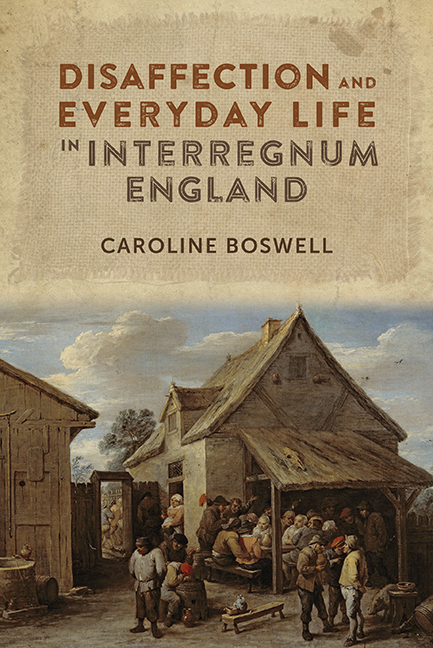Book contents
- Frontmatter
- Dedication
- Contents
- List of Illustrations
- Acknowledgements
- List of Abbreviations
- Introduction
- Part I Sites of Disaffection
- Part II Objects of Disaffection
- 3 Meddling Soldiers
- 4 The “Unnatural” Excise-man
- 5 The Rise of the “Fanatic”
- Conclusion
- Bibliography
- Index
- STUDIES IN EARLY MODERN CULTURAL, POLITICAL AND SOCIAL HISTORY
4 - The “Unnatural” Excise-man
from Part II - Objects of Disaffection
Published online by Cambridge University Press: 23 August 2019
- Frontmatter
- Dedication
- Contents
- List of Illustrations
- Acknowledgements
- List of Abbreviations
- Introduction
- Part I Sites of Disaffection
- Part II Objects of Disaffection
- 3 Meddling Soldiers
- 4 The “Unnatural” Excise-man
- 5 The Rise of the “Fanatic”
- Conclusion
- Bibliography
- Index
- STUDIES IN EARLY MODERN CULTURAL, POLITICAL AND SOCIAL HISTORY
Summary
Let all Excisemen hereby warning take
To shun their Practice for their Conscience Sake.
Facing the increasing costs of war against Charles I, parliamentary leaders reluctantly established the excise tax in 1643. The tax was levied on commodities such as pewter, salt, cloth and – to the vexation of all – on meat, beer, ale and cider. Unpopular from the outset, the excise provoked angry grumblings, protests and an array of printed polemics against the new tax throughout the mid- to late 1640s and the 1650s. Alongside the creation of the excise was a figure fit for derision: the newly anointed “excise-man”. In ritualistic encounters with the excise-man, Englishmen and women treated the collector as an intrusive agent who drained resources, threatened customary politics and unsettled social relations. Drawing upon this vast reservoir of popular hostility and resistance, disaffected authors helped to launch the caricature of excise-men into the popular political imagination. In one such satirical pamphlet, The Excize-Mens Lamentation, the state's infamous tax collectors ask God to pardon the “miserable Excize-men” for their “high, unjust and illegal proceedings”. Mimicking the language of the Lord's Prayer, the greedy collectors “confess” that they have accumulated “vast and great sums”, which they “wickedly, fraudulently and deceitfully gained by an unlimited and out-stretched Conscience”. Ever indiscriminate, the excise-men acknowledge that their practices have been “rigid and harsh both to the Rich and Poor”. Their lamentation ends with a plea begging the “Lord” to dissuade the excise-men from their “ways of wickednesse”, and to provide them with “hearts to dread him”.
Following the excise-men's confession, the anonymous author notes that, despite their “lamentation”, many collectors remain very “rigid and cruel to the poor”. Detailing a recent encounter between “a Farmer of Excize” and the inhabitants of Monmouth in 1652, the author claims that John Crowe's “cruell proceedings” provoked the “poor people” to scour the local inn in search of this intrusive outsider. The report maintained that Crowe was able to escape his quarters only to run into a “Tub of Feathers”. Rather than assault the excise-man after capturing him, the agitated crowd made Crowe “swear on the Bible, that he should become an honest man”. He was subsequently allowed to go his way, and though the protesters “dismissed him without wounds”, they effectively “frightened him out of his wits”.
- Type
- Chapter
- Information
- Disaffection and Everyday Life in Interregnum England , pp. 165 - 204Publisher: Boydell & BrewerPrint publication year: 2017

